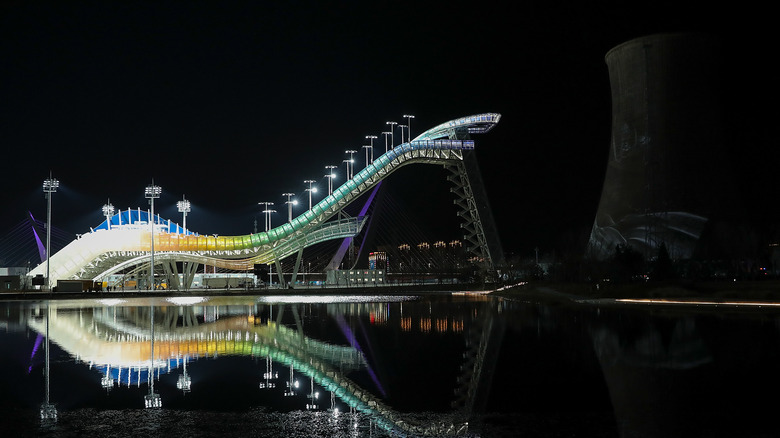How Much Do The Winter Olympics Really Cost?
The Winter Olympics in Beijing are set to begin in February 2022, prompting many to ask, "How much could it possibly cost to slide down a mountain with sticks strapped to your feet?" Quite a lot, it turns out.
The Olympics are typically seen as a major investment. Countries incur heavy costs when building facilities, but get tons of ad revenue and tourist money (disregarding COVID-19). Take the National Alpine Ski Center northwest of Beijing in the mountains of Yanqing. Recently finished, filled with 49 million gallons of water for fake snow (per The Guardian), total capacity of 8,500 spectators (per the Olympics), 15.5 miles of slopes across nine lifts (per Ski Resort), and in the end called "one of the greatest racing mountains in the world" (per Ski Asia). No news on how much the whole thing actually cost, but we can assume it wasn't cheap. And, it's only one venue of many, including the ridonkulous Big Air Shougang, a roller coaster-looking snowboarding and freestyle skiing site repurposed from a steel mill complete with an industrial backdrop (on NG-Lab).
Costs for such facilities don't include changes to infrastructure and train lines (like China's new Beijing-Zhangjiakou High Speed Railway), modifications for para-athletes and guests with disabilities, and much more. Relatedly, the city of Sapporo is already looking to cut its bid for the 2030 Olympics by 20%, per the Japan Times. And the Winter Games, it turns out, are typically much cheaper than the Summer Games.
Sliding on snow and ice costs loads
True to its name, Towards Data Science has an excellent summary of how much the Olympics costs, going back decades, whether Winter or Summer. But, its figures don't include "road, rail, airport, hotel, and other infrastructure." Realistically, each value is much, much higher.
Overall, costs have gone up from 1960 to 2016, which isn't surprising. Besides inflation, hosting the games has become somewhat of a muscle flexing contest between nations. To the point: The 2014 Sochi Winter Games in Russia cost the most out of any Winter Games so far, at a mind-boggling $21.9 billion. This equates to $223.4 million per event, and $7.9 million per individual athlete. This is far, far beyond the next most expensive Winter Games in Beijing in 2008, at around $6.5 billion total. From there, cost generally goes down as we go back in time, all the way to the 1964 Innsbruck Winter Games in Austria, which cost about $600,000 (with inflation, this is still only about $5.3 million in 2022, per the CPI Inflation Calculator). This means that the games in Sochi skewed the average cost of the Winter Games beyond any meaningful number.
For the record, the most expensive Summer Games were the 2021 ones in London, at $15 billion, followed by Barcelona back in 1992 at $9.7 billion. Assumedly, it costs less to build swimming pools and track-and-field venues than it does gigantic ski resorts and art deco snowboarding facilities.

